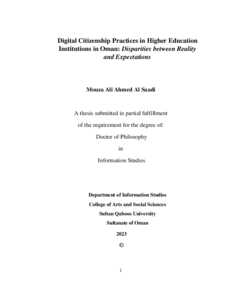وثيقة
Digital citizenship practices in higher education institutions in Oman : disparities between reality and expectations.
المصدر
Doctoral dissertation
عناوين أخرى
ممارسات المواطنة الرقمية في مؤسسات التعليم العالي في سلطنة عمان : التباينات بين الواقع والتوقعات
الدولة
Oman
مكان النشر
Muscat
الناشر
Sultan Qaboos University
ميلادي
2023
اللغة
الأنجليزية
الموضوع
نوع الرسالة الجامعية
Doctoral dissertation
الملخص الإنجليزي
The current study investigated the reality of Digital Citizenship practices in higher
education institutions in the Sultanate of Oman concerning three aspects. First, the degree
to which graduates' documents in Higher Educational Institutions (HEIs) include Digital
Citizenship dimensions. Second: exploring the level of practice in the dimensions and
competencies of Digital Citizenship of higher education students at the undergraduate
level. Third: exploring statistically significant differences in practicing Digital Citizenship
among higher education undergraduates attributed to some demographic variables. The
study attempted to interpret these quantitative results from the point of view of the
undergraduates themselves, academics, and experts. Finally, the current study aimed to
develop a framework for enhancing Digital Citizenship practices in Omani higher
education institutions.
The study adopted a mixed-method approach with a sequential explanatory design,
incorporating both quantitative and qualitative phases. In the first stage, the content of
graduate attributes documents from a sample of higher education institutions was analyzed
to determine the level of their inclusion of the six dimensions of Digital Citizenship
(digital identity, digital civic participation, digital information literacy, digital ethics,
digital safety, and digital global communication). Then, Quantitative data was collected
by applying situational judgment tests on a sample of (855) Omani undergraduate students
to identify the reality of their practices for the six mentioned dimensions of Digital
Citizenship and to detect any significant differences based on some demographic
variables. In the qualitative stage, focus group tools were applied with a sample of students
(24), and semi-standardized interviews with academics and experts in higher education
(6) were conducted. The aim of this stage was to provide a profound explanation for the
quantitative findings and to investigate participants' suggestions for enhancing Digital
Citizenship practices in HEIs.
The study reached several results, the most important of which is that the reality of
undergraduates' Digital Citizenship practices in higher education institutions reached a
medium degree. The average score for practicing the six dimensions of Digital Citizenship
ranged from medium to low (3.00 to 2.15). Four dimensions (digital literacy, digital global
connectivity, digital safety, and digital ethics) were practiced at an intermediate level. In
contrast, the practices of digital identity and digital civic engagement dimensions were at
a low level. Moreover, the results of the total average of the quantitative data revealed no
statistically significant differences in the level of practicing Digital Citizenship regarding
gender, type of institution, field of study, and year of study. However, some significant
differences emerged within some dimensions of Digital Citizenship: digital ethics and
digital safety regarding the gender variable, digital safety and global digital
communication regarding the type of institution variable, and digital ethics with the study
year variable.
The qualitative analysis of the interviews using the (MAXQDA) program confirmed the
level of some practices and explained the differences in judgment in other practices
between the views of the undergraduates themselves and the academics. The qualitative
analysis also produced several suggestions to improve Digital Citizenship practices. In
light of the results of the study and the analysis of the current reality of Digital Citizenship
practices, the study concluded with a proposed framework that represents a road map for
enhancing Digital Citizenship practices in HEIs in the Sultanate of Oman.
الملخص العربي
هدفت الدراسة الحالية إلى الكشف عن واقع ممارسة المواطنة الرقمية في مؤسسات التعليم العالي بسلطنة ُعمان من خلال ثلاثة جوانب؛ أولا: درجة تضمين وثائق سمات الخريجين في مؤسسات التعليم لأبعاد المواطنة الرقمية، ثانيا: الكشف عن مستوى ممارسة طلبة التعليم العالي في المرحلة الجامعية الأولى لأبعاد وكفايات المواطنة الرقمية، ثالثا: الكشف عن وجود فروق ذات دلالة إحصائية في مستوى ممارسة المواطنة الرقمية لدى طلبة التعليم العالي تعزى لبعض المتغيرات الديموغرافية، وحاولت الدراسة تفسير هذه النتائج الكمية من وجه نظر الطالب أنفسهم والأكاديميين وأخيرا هدفت الدراسة الحالية إلى تصميم استراتيجية مقترحة لتعزيز ممارسات المواطنة الرقمية في مؤسسات التعليم العالي بسلطنة عمان.
قالب العنصر
الرسائل والأطروحات الجامعية

